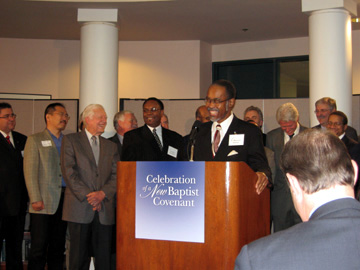In that book Hedges, once a Christian seminary student, took an unflinching look at what he had observed and concluded while working as a reporter in war zones around the world.
Hedges latest book takes an unflinching look at what he observed and concluded while reporting on the Christian Right's culture war in America. This book is called American Fascists: The Christian Right and the War on America.
Here's a link to a short essay derived from the book. The essay comes from material in the last chapter of the book. It comes from the precise section where Hedges finally succeeded in convincing me that it is no longer a stretch to couple the word "fascist" with "Christian" when describing the Christian Right. Here's a quote:
[James Luther] Adams saw in the Christian right, long before we did, disturbing similarities with the German Christian Church and the Nazi Party, similarities that he said would, in the event of prolonged social instability or a national crisis, see American fascists rise under the guise of religion to dismantle the open society. He despaired of U.S. liberals, who, he said, as in Nazi Germany, mouthed silly platitudes about dialogue and inclusiveness that made them ineffectual and impotent. Liberals, he said, did not understand the power and allure of evil or the cold reality of how the world worked. The current hand-wringing by Democrats, with many asking how they can reach out to a movement whose leaders brand them "demonic" and "satanic," would not have surprised Adams. Like Bonhoeffer, he did not believe that those who would fight effectively in coming times of turmoil, a fight that for him was an integral part of the biblical message, would come from the church or the liberal, secular elite.
His critique of the prominent research universities, along with the media, was no less withering. These institutions, self-absorbed, compromised by their close relationship with government and corporations, given enough of the pie to be complacent, were unwilling to deal with the fundamental moral questions and inequities of the age. They had no stomach for a battle that might cost them their prestige and comfort. He told me, I suspect half in jest, that if the Nazis took over America "60 percent of the Harvard faculty would begin their lectures with the Nazi salute." But this too was not an abstraction. He had watched academics at the University of Heidelberg, including the philosopher Martin Heidegger, raise their arms stiffly to students before class.
Two decades later, even in the face of the growing reach of the Christian right, his prediction seems apocalyptic. And yet the powerbrokers in the Christian right have moved from the fringes of society to the floor of the House of Representatives and the Senate. Forty-five senators and 186 members of the House before the last elections earned approval ratings of 80 to100 percent from the three most influential Christian right advocacy groups -- the Christian Coalition, Eagle Forum, and Family Resource Council. President Bush has handed hundreds of millions of dollars in federal aid to these groups and dismantled federal programs in science, reproductive rights and AIDS research to pay homage to the pseudo-science and quackery of the Christian right. Bush will, I suspect, turn out to be no more than a weak transition figure, our version of Otto von Bismarck -- who also used "values" to energize his base at the end of the 19th century and launched "Kulturkampf," the word from which we get culture wars, against Catholics and Jews. Bismarck's attacks, which split Germany and made the discrediting of whole segments of the society an acceptable part of the civil discourse, paved the way for the Nazis' more virulent racism and repression.
Other recent writers have coupled the terms "fascist" and "Christian," but they did so cautiously and with reserve. Hedges does so boldly and with little reservations. His experience with the ideology, propaganda and the vortex of violence in bombed-over bullet-ridden war zones around the world gives his writing a sense of urgency that is lacking in the writings of others.
I recommed both of Hedges' books, but warn readers that they may find it hard to sleep soundly when they are finished.








